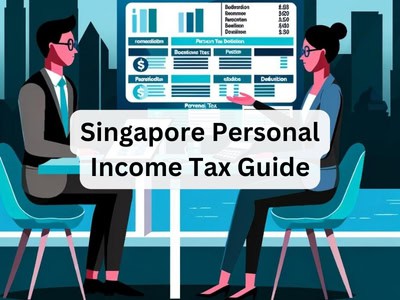This post is also available in:
简体中文 (Chinese (Simplified))
Singapore Personal Income Tax Guide 2017/2018

The personal income tax liability is determined by tax residency and amount of taxable income. Some key points of Singapore income tax for individuals include:
- The Singapore’s progressive tax rate starts at 0% and ending at 22% above S$320,000.
- No capital gain or inheritance tax imposed in Singapore.
- All incomes generated in Singapore are taxable and individuals working abroad are exempted from this.
- Tax rules could be different for each individual based on the tax residency.
- The due date of tax filing for individuals is April 15 of each year where income tax is assessed based on a preceding year basis.
Singapore Personal Income Tax for Singaporean or Permanent Resident
- Income Tax Rates
Singapore follows a progressive Singapore tax rate starting from 0% and ending at 22%. In Singapore, filing a tax return is mandatory for each individual who earns S$22,000 or more annually. Else, he or she with annual income less than S$22,000 is not required to pay tax. - Who is tax resident?
You are a tax resident if you are- a Singaporean; or
- a Singapore Permanent Resident with a permanent residential address in Singapore; or
- a foreigner who has stayed or worked in Singapore for 183 days or more in the tax years less than S$22,000
Personal Tax for Singapore Non-Residents
- Who is non-resident?
If you are a foreigner who has stayed or worked in Singapore for less than 183 days in the tax year, then you are considered a non-resident. - What will be taxed and what will be exempted?
- If you are in Singapore for less than 60 days in a year
Your employment income is exempted from tax. However, this does not apply to a director of a company; a public entertainer as well as professionals includes foreign experts, foreign speakers, consultants, trainers, coaches etc.
- If you are in Singapore for 61-182 days in a year
- All income earned in Singapore are taxable. You may claim expenses and donations to save tax except personal reliefs.
- Employment income is taxed at 15% or the progressive resident rate, whichever gives rise to a higher tax amount.
- Director fees and remuneration, consultant fees and all other incomes are taxed at a range of 15% to 22%.
How to File Singapore Personal Income Tax Returns
- You can choose to file your returns either online or by mail
- IRAS will send you the appropriate paper tax form, upon request, and the online form will be available from 1 March every year.
- Tax forms at one glance:
For tax resident individuals – Form B1
For self-employed – Form B
For non-resident individuals – Form M - You will receive your Notice of Assessment or tax bill in May to September after you have filed your returns.
- The amount of tax you have to pay will be indicated on the tax bill. In the case of objection, you will need to inform tax department within 30 days (from the date of your tax bill) and clarify your reasons.
- Full payment of tax has to be done within 30 days of receiving your Notice of Assessment regardless of whether you have informed tax authority about your objection.
- Penalties will be imposed on any case of late filing (or not filing). Please note that IRAS might take legal actions against the individual for non-filing of tax return or non-payment of the tax.
Tax Treatment of Income Earned Overseas
In Singapore, overseas income received in the country on or after 1 Jan 2004 is not taxable. The rule applies to all overseas income paid into a Singapore bank account. As such, you do not need to file return as overseas income is not taxable. However, there are a few exemptions:
- The overseas income is taxable if:
- it is received through partnerships in Singapore.
- your overseas employment is part of your Singapore employment.
- you are employed overseas on behalf of the Government of Singapore.
- How to declare taxable overseas income:
For taxable overseas income, you have to declare the income under ’employment income’, ‘trade income’ or ‘other income’ (whichever is applicable)
Tax Treatment of Employer Benefits
In general, all gains profits derived by you in respect of your employment are taxable and the gains or profits include all benefits (whether in money or otherwise, paid or granted to you in respect of employment).
Here are the examples of taxable benefits:
- Accommodation and housing allowance
- Car and car-related benefits (e.g.: car provided by employer)
- Fixed monthly allowance for transport (or if mileage on private cars are reimbursed)and meal
- Reimbursements of medical and dental treatments for yourself and dependents
- Overtime payments
- Per diem allowances (daily allowance on overseas business trips)
Capital Gains Tax, Inheritance Tax, Estate Duty
Capital gains mean the “investment income” that comes from real assets, for example, property, financial assets and so on. However, Singapore does not impose any capital gains tax.
In Singapore, inheritance tax is commonly referred to as Estate Duty, a tax that you have to pay when you die in relation to the financial estate that you leave behind. However, the Singapore’s Estate Duty has been abolished effective 2008.


